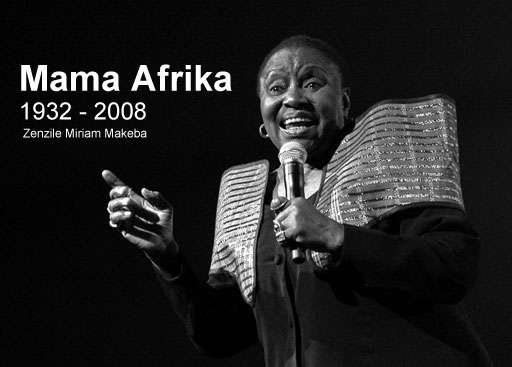AFRICA has lost another one of her Divas this month. On November 9, 2008, while performing in a concert being held in Castel Volturno, near Caserta, Italy, the talented "Mama Afrika" Miriam Makeba became ill and suffered a heart attack after singing her famous hit "Pata Pata". She was taken to the Pineta Grande hospital, where doctors were unable to revive her.

Miriam Makeba had requested an English version of Saviano’s book, "Gomorra" from one of the concert’s organizers, Corrado Gabriele. As the last notes of the grand finale, "Pata Pata," played, Gabriele and another organizer, Maria Nazionale, began climbing on the stage to present Miriam Makeba the requested book with an inscription of hope that all Africans would be able to feel happy and free in Italy. Miriam Makeba fell on the stage to the horror of the terrified and worried audience.
Zenzile Miriam Makeba was born on March 4 1932 in Prospect Township, Johannesburg, South Africa. She was more than just a talented signer, but also a civil rights activist, which earned her the name of "Mama Afrika."
Miriam’s mother, Swazi Sangoma, and her father died when she was only six years old. She began singing at an early age while attending the Kilmerton Training Institute in Pretoria.
Her first music tour was with an amateur group. Her professional career started in the 1950s with the group called the Manhattan Brothers, before leaving them to form her own group, The Skylarks, which performed songs with a style blending jazz and traditional South African melodies.
In 1959, Miriam Makeba, along with future husband Hugh Masekela, performed in the musical King Kong. At that time, she was not making much money, although she was very successful as a recording artist Her break came when she took a role in the anti-apartheid documentary Come Back, Africa in that same year. The film was made by Independent filmmaker Lionel Rogosion.
Miriam Makeba then traveled to London, meeting up with Harry Belafonte. From there, she released many of her famous hits, including the famous "Pata Pata", "The Click Song", and the unforgettable "Malaika."
This led her to receive the prestigious Grammy Award for Best Folk Recording together with Harry Belafonte for An Evening With Belafonte/Makeba. This was in 1966.
In 1960, Miriam Makeba tried to return to South Africa for her mother’s funeral, but only to find out that her South African passport was revoked. Later in 1963, after testifying against apartheid before the United Nations, her South African citizenship and rights to return to her own country were revoked.
Controversy eroded Miriam makeba’s success in the United States when she married Trinidadian civil rights activist and Student Non-Violent Coordinating Committee leader Stokey Carmichael in 1968. Her record deals and tours were suddenly cancelled. As the result of the controversy, the couple moved to Guinea. The relationship with Carmichael ended in 1973, and Miriam stayed and performed primarily in Africa, South America, and Europe.
In 1974, Miriam makeba made her appearance among many other African and Afro-American entertainers at the famous Rumble in the Jungle boxing match between Muhammad Ali and George Foreman, which was held in the Democratic Republic of Congo (Zaire).
Miriam Makeba lost her only daughter Bongi Makeba in 1985. She later published her autobiography Makeba: My Story (ISBN 0-453-00561-6).
In 1990, Nelson Mandela convinced her to return home to South Africa. Miriam Makeba did not limit her career in the music world. In 1991, she made a guest appearance in one episode of the famous "The Cosby Show". In 1992, she starred in Sarafina!, a movie about the 1976 Soweto youth uprisings. She played the role of "Angelina," the main character’s mother.
In January 2000, her album, Homeland, produced by Cedric Samson and Michael Levinsohn was nominated for a Grammy Award in the "Best World Music" category. In 2001 she was awarded the Gold Otto Hahn Peace Medal by the United Nations Association of Germany (DGVN) in Berlin, "for outstanding services to peace and international understanding". In 2002, she shared the Polar Music Prize with Sofia Gubaidulina. In 2004, Makeba was voted 38th in the Top 100 Great South Africans. Makeba started a worldwide farewell tour in 2005, holding concerts in all of those countries that she had visited during her working life.
The concert performed on November 9, 2008 was for the support of writer Roberto Saviano in his stand against the Camorra, a mafia-like organization in the region of Campania. She was singing for the sons and daughters of immigrants staying at a local charitable organization and shelter in Castelvolturno, Centro Fernandes, where she also posed for pictures and exchanged hugs with the crowds.
She died while doing what she loved the most: singing and defending a cause. In his condolence message, former South African president Nelson Mandela said it was "fitting that her last moments were spent on a stage, enriching the hearts and lives of others - and again in support of a good cause.
Goodbye Mama Africa; we will surely miss you down here on Earth.



